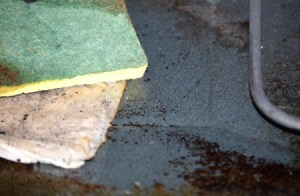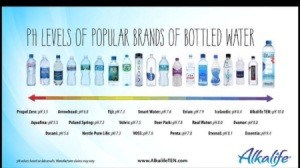
 This picture below is of the bottom of "my" grimy oven. You can see the clean spot that I used the folded up paper towels and bottled water on, and you can see the burnt-on areas I've not gotten to yet. I laid bottled water saturated paper towels on the burnt-on stuff in the bottom of the oven for an hour or less (didn't time it) and then used my scrubby to wipe it off.
This picture below is of the bottom of "my" grimy oven. You can see the clean spot that I used the folded up paper towels and bottled water on, and you can see the burnt-on areas I've not gotten to yet. I laid bottled water saturated paper towels on the burnt-on stuff in the bottom of the oven for an hour or less (didn't time it) and then used my scrubby to wipe it off.
The bottled water is now being used in place of any kind of oven cleaners, or anything else. I can use a scrubby on the oven. It scrubbed off very easily too, really easy in the oven actually, and I used nothing BUT bottled water in place of any cleaner to loosen up the burnt-on grime.
If you don't want to heat your oven up, you can simply fold up some paper towels, then lay them in the oven. Here's what you do.
Heat up a 1/2 cup of the bottled water in the microwave.
Then carefully pour that hot water on top of the folded paper
towels, and then let that sit for 30 - 60 minutes. That way, you don't haveto heat up the entire oven for "spots" in your oven that you want clean.
And like I mentioned, you can heat up 1/2 cup or so of the bottled water in the microwave and pour that on top of your folded paper towels and let that sit on the icky areas. You don't really even have to heat your oven doing it this way.
And, if you've just got done baking, and you've turned off your oven, when it cools enough (not completely) where saturated paper towels won't steam away because the oven is too hot, then that's a good time to use this method too.
For an oven door (the inside glass) if grease is basically baked on
like an enamel, then heat/warm your oven first, then turn it off, and soak your paper towels with bottled water, and lay that on an area, moving the paper towel pad as you go along, and that too will come right off with a scrubby.
The bottom line is: NO chemicals, nothing, just bottled water to do the job, and it does it just as well as anything with a brand name on it.
Add your voice! Click below to comment. ThriftyFun is powered by your wisdom!
I can't wait to try this!
That is really good for cleaning but what about how good is it to drink. I mean gosh what is in that bottle of water.?
The reverse osmosis process used by most water bottlers has removed the impurities and chemicals from the regular tap water making it a better cleaning agent.
Why use bottled water that costs more than using cheaper tap water?
Syd
There's so much to understand about water, but to the best of my knowledge this country has an average pH in tap water to be about 8.0, which is on the alkali side - and which is also why we see the "white mineral spots or water deposits" that are left when water dries up on anything from glassware to appliances - which is nothing compared to how it builds up in our pipes in our homes.
Bottled water (most brands) are highly acidic, which is the contrast to alkalinity, and is why a lot of people use products such as vinegar which is acidic, to remove the left on alkali deposits like the "water spots".
Cleaning baked on grunge/grease from the oven with "acidic water" basically, breaks it up, which makes it easier to wipe off. If we use alkaline products, they don't break anything apart as well as acidic does, especially grease.
I know, it makes it sound like there's some kind of cleaning agent in the bottled water, but there isn't.
Simple things like water and ion exchanges and all that scientific stuff is what I think we all should have been taught in school growing up, as they're quite important later in life.
It's just about our water, some parts of the country do have extremely high alkalinity in the water-which is what we call mineral deposits (and one will know if they're always dealing with spots on their glassware) as that's the calcium and lime, magnesium etc (in the water) which is very natural, but, it also is quite detrimental to our house pipes, which you can imagine, just seeing white spots on our glassware from a rinse of a glass, imagine all what's being left in our pipes and water heaters because that's in there for years, just compounding and becoming thicker and thicker, to where some homes actually loose water pressure as the pipes become smaller from the buildup. Many water heaters too have to be replaced just because of the (hard water) deposits clogging them up.
Those minerals in the water are what gives us a more alkali tap water, as it's loaded with minerals which is good....and bad.
Most bottled waters, not all though, are acidic.
Distilled water is acidic too because the minerals have been removed.
So "any natural acidic water" like distilled, or just plain bottled water (not re-mineralized, but rather DE-mineralized) water will be acidic and works so great for "water deposits" in removing them, plus it breaks up grease too.
Here's an interesting statement I copied from this link below:
Distilled Water Absorbs Carbon Dioxide
The pH of pure, distilled water in a *vacuum* is 7; it is neither acidic nor alkaline.
Immediately after distillation, however, water begins absorbing carbon dioxide from the atmosphere, and it forms carbonic acid -- a weak acid. This absorption continues until the carbon dioxide concentration in the water is the same as it is in the atmosphere. At this point, the pH of the distilled water is around 5.8.
This is just a chart I found, there's just so much about water that we don't realize or even give a thought to.
Water with a pH over 7 is considered alkaline.
Water with a pH under 7 is considered acidic.

Rather than bottled water, you can get the same acidic cleaning by just adding a little White distilled vinegar to your tap water, and STOP BUYING ALL THOSE PLASTIC BOTTLES OF WATER, THAT WIND UP EVERYWHERE (not just)IN LANDFILLS, UNLESS RECYCLED. You get the same cleaning agent...an acid diluted with water, and, you're not helping to pollute the Earth with plastic.... which is a PETROLIUM product. Means: LESS OIL NEEDED, LESS PLASTIC WASTE, LOWER COST, NO PACKAGES OF WATER BOTTLES SITTING AROUND.... It's a win - win solution. Come on people, we are killing our planet with pollution !!!!!
Add your voice! Click below to comment. ThriftyFun is powered by your wisdom!